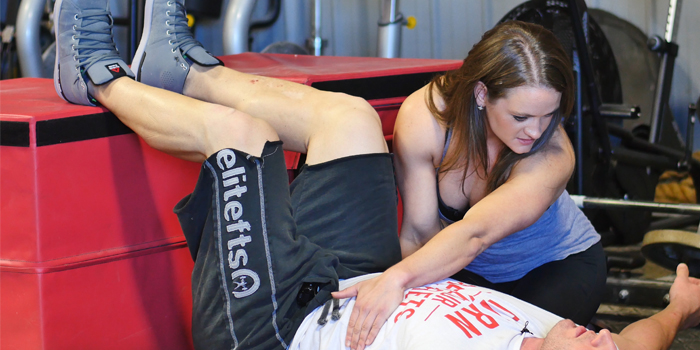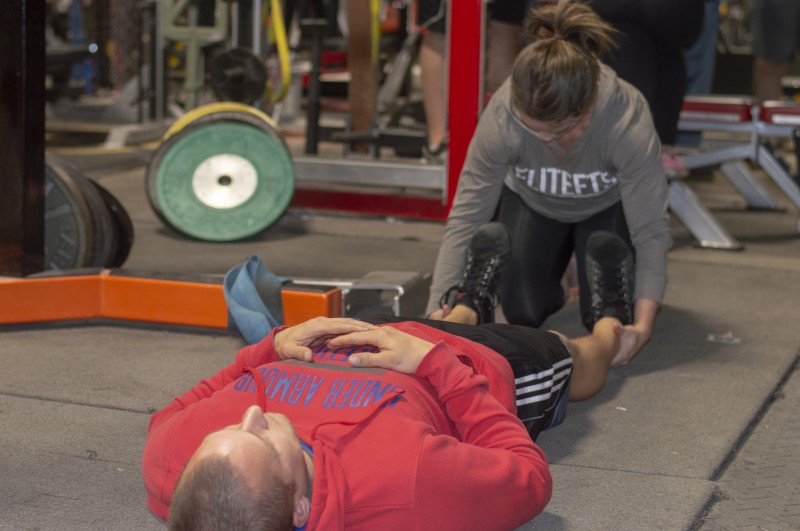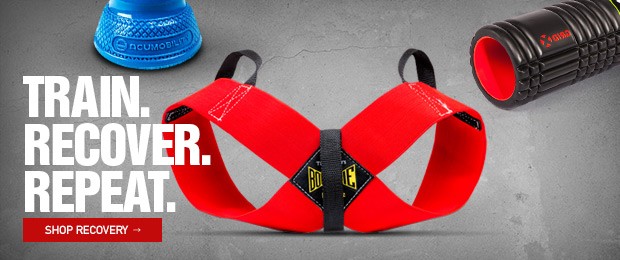
"How can I make a career out of working with strength athletes?" I get asked this, a lot. I’ll paint an honest picture for you, and though I write this in the context of a physical therapist (PT), much of this could go with almost any industry, I imagine. The more time we spend on social media, the more our sense of reality can become a little distorted. There’s a lot to be said for the “highlight reel” that many people post, and I don’t think that coaches, rehab pros, or PT's are much different. It’s very, very easy to make a story appear to be one thing or another without acknowledging the reality of what goes on behind the scenes. I bring this up because lately, I’ve gotten more than one email asking me how one can make a career out of being a PT that works with and treats strength athletes — which is funny, because I think relative to many others, I post very little about PT related things (mostly because I spend the greater portion of my week treating patients where I don’t have a phone handy).
RECENT: The Second Phase of Injury: Changing the Plan
The reality is that, while those of us that train certainly have an appreciation for what it means to us, very few PT’s have the luxury of owning their own gym, of working in an area of the country where iron sports are big enough to have a niche market, or of having a clinical lifestyle that so many YouTubers and Instagram-famous PT’s have. When I first started writing for elitefts almost three years ago, there were maybe two or three PT's or chiropractors that had a peer-like presence in the lifting community. We could all point to Stu McGill, Charlie Weingroff, and others for their work, but my point is that at that time, I knew of myself, Rori Alter, and a small handful other PT's, like Greg Inocencio, who actually trained and competed in something at the time. That number has exploded in the last 12 months, largely via utilization of social media to present oneself as either an opinion leader with less than a year of true experience under the belt, or having never actually handled anything remotely heavy and felt the effects that kind of training has on your body. That catapult has grown this expectation that the “online” presence is the most meaningful, or important, one; that the presence working with exclusively athletes is the only one by which a clinician can be measured by. There’s a lot of pressure. I’ve felt it, too.
It’s easy to get lost and caught up in keeping up with the PT-Joneses. The threat of feeling “insufficient” or not good enough or “behind” is so easy to become overcome by. What being a PT means for those of us who train is that we have a deeper why, and deeper understanding of what a person wants to do. My mentor calls this a person’s pain — not the pain they feel or the cranky area of their body we’re trying to treat, but what is that person’s loss?
I want to make it clear: the ability to work with predominantly iron sport athletes as a PT, although not impossible, requires a good number of things that you may or may not have control over to align, or that will require significant amounts of time, quality of life evaluation (e.g. do you want to grind 80 hours a week? I’d rather see my husband now and then, no shame), including finances, family commitments, and geography. As a PT, on a full day I see 16 people who expect my best clinical judgment as well as an empathetic ear every 30 minutes, have documentation and emails to local clients, physicians, and coaches, articles to read and forums to stay “active” on, and CEUs to pursue, while concurrently wanting to be the best wife, training partner, and daughter I can be — while also doing “bonus” things that I enjoy in the strength athlete realm, consulting with athletes, my online business, and the writing I do here. It’s exhausting reading it, but what both Dave Tate and my clinical mentor have guided me through for years (almost 10 for my clinical mentor), is that without knowing the reason for doing anything, you’ve missed the boat. I truly believe that without knowing your “why,” especially in a field like healthcare, burnout rates will continue to climb. It’s sad but is the current state of the non-cash based outpatient PT world.
WATCH: Fixing Dave Tate — Initial Assessment with Dr. John Rusin
That all sounds a little deflating, but I wanted to give some context. I recently got an email from a PT prospective student, wanting to know how I chose to become a PT, and how I made a career out of working with some of the strongest people in the world. I could come up with a whole list of things I did well and things I didn’t do well, and I have a long backstory (I’ve been working in PT clinics since I was 15; I’m now 30), but the number one thing that has revolutionized my ability to integrate training and powerlifting with being a PT who loves working with lifters but can’t pay her student loans doing just that is this:
“I am lucky enough to be around mentors who have core values that synergize with my own and actually remind me a lot of Dave Tate in regard to how much they care about people. I love getting to work with the lifters that I do, but that is because they resonate most closely with my own personal experiences. I need training. Period. That personal experience that I've had with training, injury, and the whole rehab process, 100%, I believe is what has made me an effective PT; I just need to acknowledge that the analog to me with powerlifting might be the patient and walking their dog or hiking a fourteener. It's not the same activity, but for me, it is; it acknowledges their 'pain', because my why [I do anything] is [clearly defined as] 'to compassionately serve, empower, and bring order to chaos, so that people can return to the thing that gives them the intangible that powerlifting gives me.'”
All the clinical learning, research, and online accolades or followers in the world may make your highlight reel appear full, but without knowing why you do what you do, to me, lacks meaning and purpose altogether. I have such a huge passion for vibrant, full life, which is probably why I tend to my in-person clients as well as my online ones, but there’s a reason for it. In early 2012, I left the most influential job I have ever had. My boss at the time (the same one I have come back to work for now) completely revolutionized how I saw not just PT but also how to serve people, after having worked in multiple orthopedic clinics through high school and college. I bought him a book that he hadn’t mentioned, but I felt really hit the nail on the head with just how he had impacted me, and the part of our company culture that I thought was so different. No surprise, the book was Start with Why by Simon Sinek. It relates a little bit to how I responded to my more recent email inquiry:
“I totally hear you on the powerlifting making you want to pursue PT. I think we as athletes know what it means to be able to get under a bar, and what training means to us physically and mentally. It's not the kind of thing that someone can explain really; you just know you've felt 'it,' whatever that intangible 'it' is. I think going forward for you, being able to articulate why powerlifting makes you want to pursue PT is a huge deal. It determines your 'why' for what you do, and out of that 'why' you will probably start to see a lot of your personal core values come through and shine a bit. Dave Tate helped me with this a few years ago. Those core values are your guideposts for every decision you make, personally and professionally, going forward. He helped me through this in the context of starting my own online business, but I have used those core values for almost every other big decision I've made since that conversation, from moving to new jobs, to meeting and marrying my husband. I can say that the few times I've deviated from those values—even if I thought it would bring me closer to my 'goal' of continued client flow, clinical learning, performing at meets, etc.—the outcome has almost always (big picture) derailed me from growing these two passions (PT and powerlifting) in a way that was fulfilling, rather than draining and exhausting.”
Being a PT is an incredible gift. There is immeasurable power in the relationships and gift of the people seeking help, rather than a social media following. It is demanding, and you give a lot of yourself to people, but it hurts my soul a little every time I hear someone say that “gen pop” isn’t as deserving of time because they aren’t Division I athletes or world record holders, or are “easier” to treat (because clearly, chronic pain isn’t a thing). It’s a tremendous loss for that patient. But, it’s safe to say that most people-oriented jobs, whether PT, coaching, teaching, or anything else that is relational in a tangible way (e.g. not on social media), have the potential to be either incredibly draining or incredibly humbling to be entrusted with such a gift. The biggest piece of advice I could ever give to a PT hopeful or new graduate, other than to find great mentors, is to know your character, to know your why, and to approach it humbly. If you don't, no matter what you do or how well you do it, you won’t feel like you’re enough; you’ve got no barometer.
Does my boat totally float working with strength athletes, more than others? Without a doubt, it gets me excited, but that doesn’t mean it is the only place to find and seek professional satisfaction, provided the foundational principles and core values are in agreement. Do I wish I had more time in my week to film videos, put together a more formal website, and make myself “appear” cooler with more followers? Sure I do — strength sports are what I love. But time isn’t running out for those things, and the more opportunity you have to grow the heart of why you do anything, the deeper those roots grow, and the more likely you will be to stay the course when things get hard. Dr. John Rusin didn’t build himself overnight, and he’s one of the few qualified enough to truly drink all his own Kool-Aid. While most of us who start down the field of PT or coaching have an initial vision of what we want to do (I think half my PT school class wanted to work with pro sports), you might just be surprised at where your why takes you.
Mine brought me to serving people, period.











